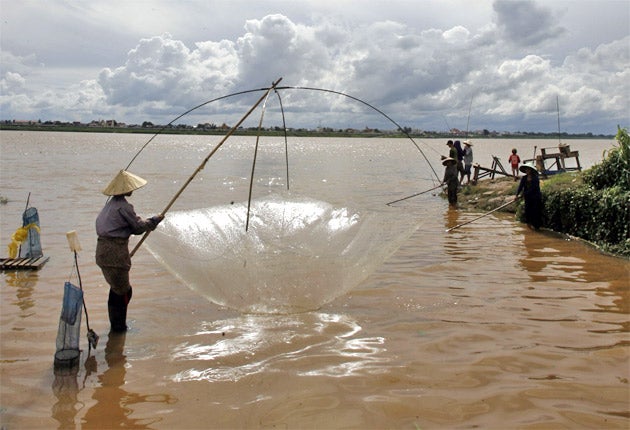Mekong ecology in the balance as Laos quietly begins work on dam

Environmentalists opposed to a controversial dam that could have a devastating impact on one of Asia's most important rivers have accused the authorities in Laos of starting work on the project without formal approval.
An intergovernmental meeting in Laos has failed to reach agreement on the proposed £2.1bn, 1,260-megawatt Xayaburi dam on the Mekong river. Environmentalists say the dam will adversely affect 60 million people and Cambodia and Vietnam – concerned about the flow of water further downstream – are officially opposed to the project.
But reports over the weekend revealed that work on the proposed project in northern Laos was already under way and that the Laotian authorities and a Thai construction company that has the contract for the work had already prepared several miles of roads and set about removing local villagers by giving them £10 in compensation.
"Local people say that work, particularly on road construction, began several months ago," said Pianporn Deetes, a Bangkok-based activist with International Rivers, an NGO that has called for work on the dam to be postponed while further assessment is completed. "Sixty million people in the lower Mekong depend on the river in one way or another, either for fishing, irrigation or farming. If the dam goes ahead, these people will all be affected directly or indirectly."
Similar warnings were contained in an environmental assessment study published by the Mekong River Commission (MRC), an intergovernmental body comprising Vietnam, Cambodia, Laos and Thailand which was established in 1995 to promote the "sustainable management" of the river, famed for its giant catfish. That study said that if Xayaburi and subsequent schemes went ahead, it would "fundamentally undermine the abundance, productivity and diversity of the Mekong fish resources".
The WWF has similarly warned about the impact, saying the damage to ecosystems could be reduced if tributaries of the Mekong, rather than the main river itself, were the location for dams.
The future of the dam was due to be decided yesterday by members of the MRC when it met in Vientiane. While member countries are not prevented from acting unilaterally, officials say they prefer to agree to a broad consensus on major projects.
But a statement issued by the MRC members suggested the body would not be able to prevent Laos from pushing ahead with the project. The statement said there was still a "difference in views" and the issue should be handled at ministerial level. Reuters reported that the Laotian delegate, Viraphonh Viravong, said after the meeting that Laos would consider accommodating its neighbours' concerns, but that it was not possible to further extend a consultation process.
There has been intense opposition to the dam from NGOs and villagers whose livelihoods would be affected. Letters of opposition have been delivered to Thai Prime Minister Abhisit Vejjajiva. Reports suggest that Thailand, a country with increasing energy demands, would buy most of the electricity produced by the dam.
The authorities in Laos, an impoverished country that says it needs the foreign exchange it would earn for investment in social programmes, have not responded to the claims that they have started work on the project.
But in February Vientiane issued a statement that claimed Xayaburi would be the "first environmentally friendly hydroelectric project on the Mekong and will not have any significant impact on the Mekong mainstream".
While China has established dams on the upper reaches of the Mekong – the river's source is located in the Tibet plateau – the remainder of its 3,000-mile flow is unhindered. Since 2007 plans have been announced for a total of 11 dams in Laos and Cambodia.
Join our commenting forum
Join thought-provoking conversations, follow other Independent readers and see their replies
0Comments